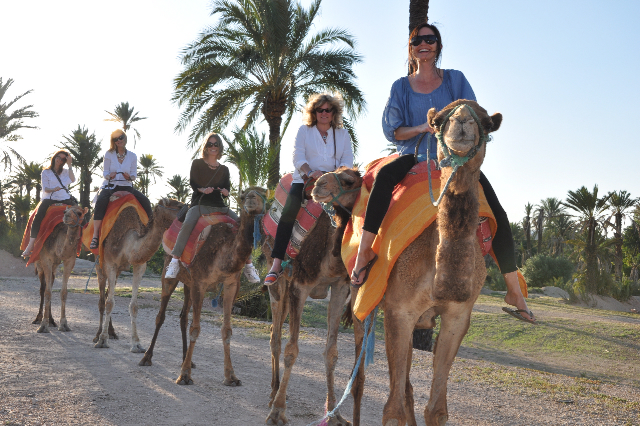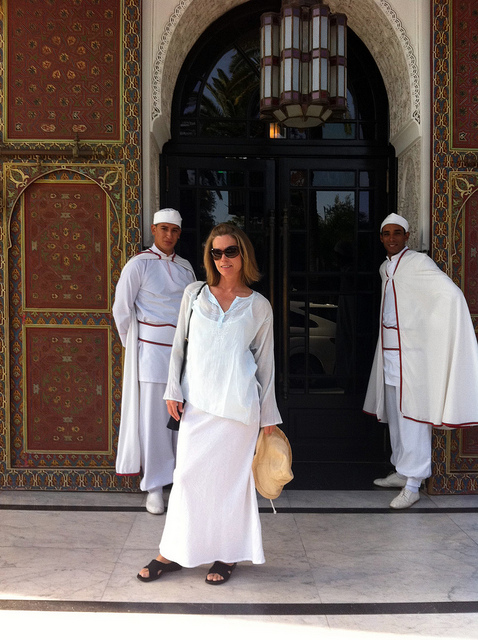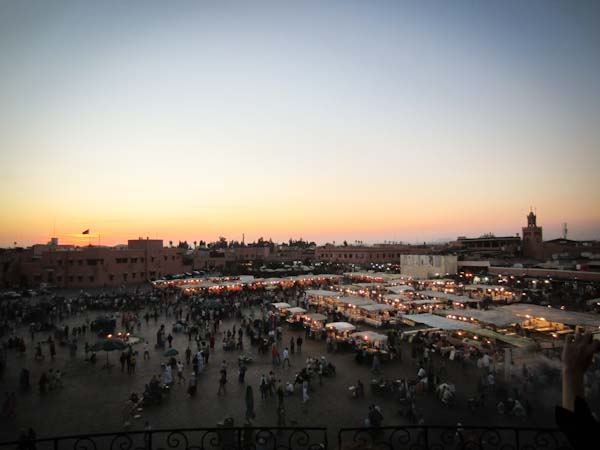Anyone who's been to Morocco Marrakesh
Chitika
Wednesday, 15 June 2011
Liverpool FC to make move for Morocco playmaker Adil Taarabt
QPR playmaker Adel Taarabt, who has been linked with a move to Liverpool, is reportedly a transfer target for Real Madrid
The 21-year-old has been a key player for Queens Park Rangers this season with his 19 goals helping the London club to secure promotion to the Premier League.
Liverpool have been keen on the Morocco international for some time, but according to Metro, Spanish giants Real Madrid are also showing interest.
Taarabt has allegedly told team-mates of the interest in him from the Spanish capital and although Real are set for a busy summer in the transfer market as they look to rebuild following Tuesday night's Champions League exit at the hands of rivals Barcelona, whether Los Blancos coach Jose Mourinho makes a bid to sign the former Lens player remains to be seen.
Liverpool's director of football Damien Comolli is responsible for bringing the highly-rated youngster to England and was involved in his move from Lens to Tottenham in 2007.
Should Liverpool reach a deal with QPR then Spurs are also set to cash in as they are believed to have included a sell-on clause when they sold Taarabt to QPR last summer.
Visiting Morocco in the middle the Arab Uprise
Read Jennifer Evans story written by her..
They told us not to go.
Not to Morocco
With uprisings in the Middle East and North Africa, Morocco
"Morocco is different," they assured us at DAI Travel and Austin Lehman Adventures, who both designed fantastic custom tours for us, insisting that Moroccans are peace-loving people. But things were heating up.
Four weeks before we left, a café in Marrakech's busy Djemaa el-Fna was bombed, killing 16 people. Days later, Osama bin Laden was killed by Navy SEALS. Really? we joked. They had 10 years to find him, but they had to do it right before our trip?
Resisting the temptation to chicken out, we opted for an abbreviated (three-day) trip to Marrakech via Paris
Air France took us as far as Paris Paris
Marrakech has been booming for years, and there are scores of hotels and riads to choose from, but I only wanted to stay in one place: La Mamounia, the mythical 1920s luxury hotel where Winston Churchill, Franklin Roosevelt and celebrities, such as the Rolling Stones stayed decades before us. From this recently renovated fairytale venue, surrounded by 17 acres of gardens, we could explore the gritty souks and take a day trip to the High Atlas Mountains, yet still return to the lap of luxury, where a hamam and a fabulous meal awaited. It's perfect for those who want to experience Marrakech, but prefer a protected experience.
When we arrived, six gorgeous doormen in traditional garb swept open the palatial doors with broad smiles; then we were ushered to a seating area in the exquisite lobby, where fresh dates and almond milk scented with orange blossoms awaited, the traditional Moroccan welcome. Our suite, filled with fresh fruit and local sweets, was extravagant -- two sitting rooms, a bedroom, two bathrooms, a walk-in closet and two dressing areas. What more could we want?
Our first stop was -- what else -- a camel ride in the Palmeraie near the outskirts of Marrakech. Our guide Khadija and driver Abdul tried to keep straight faces as we hoisted ourselves upon five one-humped dromedaries like the tourists we were. "Hold on tight," they warned, as my camel lurched to his feet, pitching me forward. I clung to the metal "reins," wondering how bad of an idea this was. I glanced at Arianne, who was holding on for dear life, and we cracked up, mostly from anxiety, but also aware of how ridiculous we were. "Whose idea was this?" we laughed, thankful that the Sahara was too far away for that overnight trek we'd considered.
We dove into the throng of the Jemaa el-Fna Square, our lives passing before us as we dodged donkeys, motorcycles and carriages on the "pedestrian" square. Our senses stirred with the exotic scents, sights and sounds of snake charmers, "water men" and storytellers, along with locals selling everything from aphrodisiacs to orange juice. A toothless old man threw a monkey onto Pilar's shoulder, and she and Lorraine
The sight of the bombed Argana Cafe was unnerving, especially when we climbed the stairs of an identical café across the square to take in the view of the Katoubia minaret, now pink in the setting sun. But we'd chosen faith over fear, so I closed my eyes and listened to the hauntingly beautiful call to prayer.
That night we dined on cinnamon scented b'stilla and fragrant chicken tagine in the lush gardens of Le Marocain, pretending not to notice the armed guards who roamed the lavish property with bomb sniffing dogs.
After a heavenly night in our suite, we headed to Yves Saint Laurent's lush walled Jardin Marjorelle, followed by a tour of the 19th century Bahia Palace
A day trip to the Berber villages of the High Atlas Mountains was the perfect anecdote to shopping, with a picturesque lunch at Domaine de La Roseraie, a resort engulfed in thousands of garden roses overlooking the valley. Too tired to make rational decisions, we ordered cheese soufflés and French onion soup, and got what we deserved: bland food, but for the insanely delicious Moroccan black olives and bread. En route back to Marrakech, we met an elderly Berber woman decked out in a colorful mix of Western clothes, her beautiful smile reminding us that serenity costs nothing.
At Le Tobsil, a four-star riad restaurant set inside a labyrinth of ancient walls, candle-lit tables strewn with rose petals and the mesmerizing sound of Gnaoua musicians set the mood as we were served course after course of traditional food and wine.
Our eyes were full as we said goodbye to Khadija and Abdul who, by now, had become more than just guides, but friends. In Moroccan style, we shook hands and touched our hearts. In American style, we hugged them close.
I often joke that as a child, I was raised on a steady diet of fear. For me, traveling to an exotic destination despite recent world events is facing fear head on.
Why go to Morocco
Now ... where shall we not go next?
Tuesday, 14 June 2011
Solution 30 closes in Tunisia and opens in Morocco.
Solution 30 closes in Tunisia and opens in Morocco
Source: boursier.com.
Source: boursier.com.
In an interview published on the site: www.boursier.com, Gianbeppi Fortis, CEO of Call Center “Solutions 30” confirmed the closure of this company in Tunisia and its relocation in Morocco
"We suffered a lot in the first quarter because of problems in Tunisia
We took the decision to close the call center in Tunisia and opened a centre in Morocco
Moroccan firm aims for $13 mln amid Arab IPO drought
Stroc Industrie will offer investors in the Casablanca
The new shares will represent 23 percent of the company's capital after the IPO. Stroc will make its trading debut on July 1 at the latest.
"Stroc's listing price offers a PE of 14.2 times 2011 earnings which is below the Casablanca
Stroc Industrie, which specialises in the construction of industrial units, wants to use IPO proceeds to expand its activities.
In addition to a sharp drop in traded volumes, the Casablanca bourse has lost close to 10 percent of its capitalisation since Zine al-Abidine Ben Ali of Tunisia became the first leader to be toppled by the so-called Arab spring.
The value of IPOs in the Middle East plunged 95 percent to $21.7 million, their lowest level in five years during the first quarter, Ernst & Young said in a recent report, and show little signs of a turnaround in the near future.
The shockwaves of those revolts, that later affected Egypt , Yemen and Syria , stretched to Morocco
King Mohammed promised in March constitutional reform that should trim his powers in favour of the elected government. The monarch is expected to vet the draft reform before it is submitted to a referendum next month.
Monday, 13 June 2011
Morocco’s obsession about high scale tourism investment
While many countries try to promote their tourism by simple procedures like printing different sceneries from their tourist attractions in postal stamps like Spanish smart stamps or in their currency notes, the issue has been raised of Morocco’s mass tourism areas, such as resorts like Agadir, many of which were built with World Bank funding during the 1970s, and the potential difficulty of ‘greening’ them. And, as reported on Green Prophet earlier this month, Morocco
Sunday, 12 June 2011
Morocco is the only Monarch Arab country that can make peaceful evolution happened
If peaceful evolution is possible anywhere, it is in Morocco Morocco
The Arab Spring reached Morocco
This is precisely how those of us who wrote in years past about democratization in the Arab World imagined that change would one day come: pressure from below -- and outside -- would lead to reform from above. That was the premise behind President George W. Bush's "Freedom Agenda," and calls for the United States Egypt and King Hamad bin Khalifa in Bahrain
And that, in turn, is why the choices in the Middle East have dwindled to revolution, repression, and bribery. Since no leader has been prepared to even begin to go down a path that could lead to his downfall, citizens have realized that real reform requires regime change. They've succeeded in Egypt and Tunisia ; been checked, so far, by overwhelming violence in Libya , Syria , Yemen , and Bahrain ; and remained silent in Saudi Arabia Jordan and Morocco Jordan
In his March 9 speech, the king promised "comprehensive reforms." The prime minister would henceforth be chosen by the winning party, not by the palace. The parliament would gain "new powers that enable it to discharge its representative, legislative, and regulatory mission." The judiciary, currently run by the Judicial Supreme Council under the control of the king, would be granted "the status of an independent power." New mechanisms would be established to strengthen political parties, now widely deemed moribund. And the king announced that he was impaneling a committee of legal scholars to produce a draft constitution not by some remote future date, but by June.
The king's speech provoked every possible degree of optimism and pessimism from Moroccans and Morocco Morocco 's next elections will be "totally free," and will lead to the appointment of a prime minister with the same broad powers enjoyed by the prime minister of France
Of course, what was once touted as the new generation in the Arab world, whether the young kings of Jordan and Morocco or second-generation autocrats like Bashar al-Assad of Syria Brookings Doha Center
Early reports on the draft constitutional reforms suggest that they will both empower the prime minister and curtail the king's sacred status. The new dispensation may make meaningful inroads on King Mohammed's absolute powers without achieving real democracy. As Lahcen Achy, a scholar at the Carnegie Middle East Center in Beirut , recently wrote, "the changes will not lead to a parliamentary constitution in Morocco
This is precisely the kind of incremental change-from-above that democracy promoters long hoped for. But Western reformers are no longer the only outside players in this game. Saudi Arabia , which feels profoundly threatened by the forces unleashed by the Arab Spring, has increasingly become a regional autocracy promoter, for example using its dominant position in the Gulf Cooperation Council to dispatch troops to Bahrain Jordan and Morocco Bahrain France , Russia , and Austria formed the Holy Alliance early in the 19th century to counteract the spread of democracy in the Americas and Europe .
Above all, the Saudis worry about the growing influence of Shiite Iran. But they fear democracy both because it could destabilize Sunni rulers in the region and because it undermines their own legitimacy. "A peaceful democratic transition in Morocco ," as Anouar Boukhars, a Morocco scholar at McDaniel College in Maryland
It's not clear how, when, or under what circumstances Morocco Morocco Morocco Morocco is engaged in a rivalry with Algeria -- which does have oil -- over the vast desert hinterland of Western Sahara , which it insists on retaining as a colony despite the lack of legitimate historical or cultural ties. Saudi Arabia has helped finance Morocco Morocco
That does not mean that the GCC will be sending troops into Morocco Morocco
The West does not have to merely watch this drama unfold. At the recent G8 meeting in Deauville Egypt and Tunisia , the two countries where protest led to political revolution (though the Saudis themselves have offered $4 million to Egypt Morocco
Subscribe to:
Comments (Atom)













